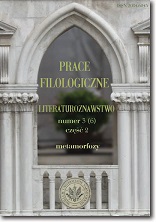Przemiana w dniu św. Marcina. Wacław Potocki o kobietach i wilczycach
Transformation on St. Martin’s Day. Wacław Potocki on women and she-wolves
Author(s): Jerzy KroczakSubject(s): Literary Texts
Published by: Wydział Polonistyki Uniwersytetu Warszawskiego
Keywords: literatura XVII wieku; Wacław Potocki; św. Marcin; karnawał; metamorfoza; literature of the 17th century; Wacław Potocki; saint Martin; carnival; metamorphosis
Summary/Abstract: The paper touches upon the transformation described in {Nowy cud w podgórskich krajach} ({A new wonder in the piedmont regions}), a poem by Wacław Potocki, a 17th century poet: a roe deer turns into a wolf during the hunt on St. Martin’s Day (November 11). In traditional agrarian culture, it was the time of abundance, gluttony and fun – the autumn carnival, when such a transformation can be explained by the laws of the world upside down. In the poem, this has been juxtaposed with the metamorphosis of women into she-wolves. The Latin word {lupa} (‘a she-wolf’), meaning ‘a prostitute’, refers to the nature of women and their power to transform town houses into {lupanars}; this metamorphosis is so curious, as it happens permanently, outside the period of carnival licentiousness. It is related to the concept, embraced by Potocki, of the degeneration of the world, in which women’s extraordinary sexual appetites lead to a humiliating metamorphosis of men into deer.
Journal: Prace Filologiczne. Literaturoznawstwo [PFLIT]
- Issue Year: 2013
- Issue No: 3 (6)
- Page Range: 297-307
- Page Count: 11
- Language: Polish

